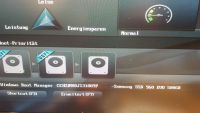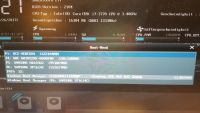Considering the usage of a NVME SSD with my 2012 PC, an Asus Z77 Sabertooth BIOS 2104 with a 3770k & 32GB memory, I decided to modify my existing BIOS
TARGET
I planned 2 steps :
1) Update the OROM, EFI and CPU Microcode modules of existing BIOS (2104) with the UBU tool
2) Add NVME support to the updated BIOS with the MMTool
STATUS
First step went very smooth, I always used the modules provided in the UBU download (v1.65) and opted for the microcode offering the best OC.
Only slight short term disagreements:
- At the beginning the UBU tool didn’t work until I found that for some unknown reasons my AV was deleting drvver.exe every time I was running the BAT file
- The generated BIOS couldn’t be flashed from the UEFI BIOS loader (corrupt message) and I had to use the USB Flashback function
Result :
All modules modified, absolutely no issues till now except that I will have to re-tune the OC parameters (4.6Ghz on all cores before). Boot time (2 Samsung 850 Pro in RAID0) approx 30% shorter
Original BIOS Modules SABERTOOTH-Z77-ASUS-2104:
Select option for update
1 - Intel RST(e) OROM and EFI SataDriver
OROM IRST RAID for SATA - 11.0.0.1339
EFI IRST RAID for SATA - 11.5.0.1582
2 - Intel OROM VBIOS and EFI GOP Driver
OROM VBIOS SNB-IVB - 2132
EFI GOP Driver IvyBridge - 3.0.1012
EFI GOP Driver SandyBridge - 2.0.1016
3 - LAN OROM PXE and EFI UNDI - Intel, RTK, BCM, QCA
OROM Intel Boot Agent GE - 1.3.81
EFI Intel PRO/1000 UNDI - 5.0.12
7 - Update Intel CPU MicroCode
Ivy Bridge CPUID 0306A9 - 17
SandyBridge CPUID 0206A7 - 28
9 - ME Analyzer
FW ME of scanned BIOS File 8.1.2.1318 1.5MB
i - Versions, HomePages and etc.
0 - Exit
Press ENTER - Re-Scanning ALL EFI modules.
Enter number:
Modified BIOS modules:
Select option for update
1 - Intel RST(e) OROM and EFI SataDriver
OROM IRST RAID for SATA - 15.1.0.2545
EFI IRST RAID for SATA - 15.1.0.2545
2 - Intel OROM VBIOS and EFI GOP Driver
OROM VBIOS SNB-IVB - 2132
EFI GOP Driver IvyBridge - 3.0.1030
EFI GOP Driver SandyBridge - 2.0.1024
3 - LAN OROM PXE and EFI UNDI - Intel, RTK, BCM, QCA
OROM Intel Boot Agent GE - 1.5.62
EFI Intel PRO/1000 UNDI - 6.6.04
7 - Update Intel CPU MicroCode
Ivy Bridge CPUID 0306A9 - 19
SandyBridge CPUID 0206A7 - 28
9 - ME Analyzer
FW ME of scanned BIOS File 8.1.2.1318 1.5MB
i - Versions, HomePages and etc.
0 - Exit
Press ENTER - Re-Scanning ALL EFI modules.
Enter number:
I will initiate the 2nd step after I get my NVME SSD (Samsung 960 Pro planned for January ![]() )
)
@Eolchi:
Thanks for the first part of your BIOS modding report.
Why did you insert Intel RAID OROM and EFI RAID modules, which neither have been designed for Intel 7-Series Chipsets nor do fully support them?
Are you running your on-board Intel SATA Controller in RAID mode at all? If yes, what was your experience with the updated Intel RAID BIOS modules?
If not, an update of the Intel RAID module version anyway wouldn’t make sense for your system.
Hi Fernando,
Q: Why did you insert Intel RAID OROM and EFI RAID modules, which neither have been designed for Intel 7-Series Chipsets nor do fully support them?
A: No particular reasons except that the UBU utility was offering the possibility to upgrade the version. Are you aware of any risks?
My target is to play a little bit with such tools before I add the NVME functionality because its a bigger change if I understand correctly.
Q: Are you running your on-board Intel SATA Controller in RAID mode at all?
A: Yes I have two Samsung 850 Pro mounted in RAID0. As said I didn’t made precise measurements but my feeling is that boot time is clearly shorter (estimation is 30% shorter).
Regarding regular usage I didn’t notice any difference. I run AS SSD (default test) and saw no differences but I have to say that my SSD RAID 0 array is almost full (93%) so I do not think that the result is relevant.
What I didn’t test till now is if I can better OC my 3770k (Ivy bridge). According to the UBU utility I changed the microcode from option 17 to 19 which should be better for OC.
I already had a quite high OC before (4.6 GHz on all 4 cores with water cooling) so lets see when I find some time to play a little bit.
By the way I have another question, do you know about any good site offering BIOS mod tools for old (2004-2008) Phoenix/Awards BIOS?
Reason is simple, call it nostalgia but I still kept two old NF4 computers, one is based on a DFI Lanparty NF4 SLI-DR Venus MB and another is based on Asus A8N32-SLI Deluxe MB. Both are fitted with FX-60, OS is Win 7 X64.
Now what is not too much known is that the 939 FX-60 or other X2 CPU of that time were equipped with the memory controller of the 940. The 940 was rather thought for servers and as such could support ECC registered RAM.
If normal DDR 184 pin sticks were limited to maximum 1 GB this was not the case for ECC version which have been available up to 4GB.
Now the funny thing is that the BIOS of the Asus A8N32-SLI Deluxe MB supports ECC and registered RAM. As per today I have 16GB memory with win 7 x64 in my 939 Asus A8N32-SLI Deluxe MB. Other funny thing because of the buffered RAM I can use 1T timing with 4 sticks, server RAM speed is not as highly OC as some dedicated selected RAM of that time but I still reach 245 Mhz which gives a relatively good memory bandwidth with 1T.
Unfortunately the DFI BIOS doesn’t support ECC registered RAM and hence my question, I’m wondering if I could modify this old BIOS and get support for ECC registered RAM. Technically considering that its about configuring the integrated memory controller of the 939 it shouldn’t be that complicated (I hope). However I was not so successful when searching such MOD tools which can only be found in some old archives without instructions.
I perfectly know that for a fraction of the costs, time and effort I could buy a much cheaper PC and get much more performances out of it without consuming 600W but somehow pushing these old PCs to the max is just fun (Wie gesagt, erste Liebe vergisst man nie ![]() ).
).
The usage of the UBU tool is very easy and safe, but it is the user’s business to find out, which one of the offered BIOS module versions is the best suited one for the related target system.
If I were you, I would do a deeper look into >this< site.
Yep, I realize that I definitely have to do a little bit more homework before inserting some modules.
Thanks for the link.
Just saw this thread thought I would post up my modded Z77 Sabertooth config.
Select option for update
1 - Intel RST(e) OROM and EFI SataDriver
OROM IRST RAID for SATA - 11.6.0.1702
EFI IRST RAID for SATA - 11.6.0.1702
2 - Intel OROM VBIOS and EFI GOP Driver
OROM VBIOS SNB-IVB - 2132
EFI GOP Driver IvyBridge - 3.0.1030
EFI GOP Driver SandyBridge - 2.0.1024
3 - LAN OROM PXE and EFI UNDI - Intel, RTK, BCM, QCA
OROM Intel Boot Agent GE - 1.5.62
EFI Intel PRO/1000 UNDI - 6.6.04
7 - Update Intel CPU MicroCode
Ivy Bridge CPUID 0306A9 - 19
SandyBridge CPUID 0206A7 - 28
9 - ME Analyzer
FW ME of scanned BIOS File 8.1.2.1318 1.5MB
No issues boots in seconds.
@aramil :
Welcome at Win-RAID Forum and thanks for your report!
With which SATA mode (AHCI/RAID) is your on-board Intel SATA Controller running?
Enjoy your Z77 system with completely optimized BIOS modules!
Regards
Dieter (alias Fernando)
Currently AHCI, I used tro run raid0 on some HDD’s but when one drive failed I never bothered resetting it up. As for AHCI/RAID versions I did run a version of this bios with a 14.X but I found it threw odd errors into the event viewer, nothing ever went wrong but rolling back to 11.x removed them, so just not sure on that one.
EDIT by Fernando: Unneeded parts of the fully quoted text removed (to save space)
so did you have luck injecting the NVMe drivers using MMTool. i tried it and could never get the BIOS file to flash over. I didnt do any of the updates using UBU tool but i took the newest z77 sabertooth bios file from ASUS and took NVMe/PCIe-AHCI drivers from the z97 sabertooth bios file and injected it into the z77 bios file, renamed it and thats where i got stuck.
i have a SM951 AHCI
@jeffsrawr :
Welcome at Win-RAID Forum!
If you want to flash a modified BIOS into the BIOS chip of your ASUS Sabertooth Z77 mainboard, you have to use the USB Flashback feature.
For details look >here<.
Good luck!
Dieter (alias Fernando)
i tried flashback feature in past when i have tried it and it always failed. found a premodded file online last night and same result. tried 3 different brands of usb stick formatted to FAT32. Z77ST.CAP file put in root. i turn off the computer, insert usb drive into usbflashback port. hold flashback button for 3 secs. it flashes for like 5 seconds than goes solid blue each time which indicates that it is not updating. do i need to buy a new bios chip? i really dont want to build a whole new computer just because ASUS was too lazy to make a BIOS update for Z77 boards to allow booting from PCI-E ssds
This is the last option, if you can exclude any mistake done by yourself.
Please have a look into >this< discussion.
UPDATE 11.4.2017
Ok, yesterday I successfully followed 1:1 the instructions published under "[Guide] How to get full NVMe support for all Systems with an AMI UEFI BIOS"
- I modified the BIOS 2104 of my ASUS Sabertooth Z77 by adding the NVME EFI module listed under >uncompressed NvmExpressDxE_2 module GUID 9A 4713C2<
- I flashed the modified (Z77ST.CAP) using the flashback method
- I installed my Intel 750 NVME SSD 1.2T
- I installed win 10 on the 750 using a win 10 ISO file stored on a USB stick as instructed under point 13 of "[Guide] How to get full NVMe support for all Systems with an AMI UEFI BIOS"
- I checked that the fresh installed system was successfully booting from the Intel NVME SSD
After that being a little bit lazy and not wanting to reinstall all the SW (~ 20 3D games , MS office, Photoshop SW…)…
- I started the system with the old SSD configuration (2 SSD Samsung 840 Evo in Raid 0)
- I updated my win 10 with the latest win 10 version (Win 10 Creator)
- I deleted the partition of the 750 SSD containing the fresh win 10 installation
- I migrated the OS contained on the RAID 0 to the 750 SSD (using Paragon SW)
I shutdown the PC, disconnected the two SSDs used in RAID 0 mode, started the PC, went in the BIOS, disabled the RAID 0 and enabled the 750 SSD as boot drive, saved the configuration and restarted…
…and it was done !!! After about 1hour my complete win 10 installation was newly booting from my Intel 750 SSD NVME
Overall performances are absolutely inline with what to expect from a Intel 750 SSD in NVME mode.
Thanks a lot to all contributors of this great Forum and of course Fernando.
PS
I can provide the modded BIOS if somebody is interested.
Hallo Modding Fans,
Does anyone have an idea what is wrong
"Secuity verification failed"
I download Verion 2104 from Asus
http://dlcdnet.asus.com/pub/ASUS/mb/LGA1…7-ASUS-2104.zip
and use the UBU.bat to create the Z77ST.CAP.
thx for help |addpics|fn9-1-00ee.jpg|/addpics|
@woofer :
Welcome at Win-RAID Forum!
You cannot flash a modded BIOS the normal way into the BIOS chip of your ASUS mainboard. You have to use the special ASUS feature named “USB Flashback“.
Regards
Dieter (alias Fernando)
It’s the same with Jeff
Maybe it is the same problem.
Just to make it as clear as possible:
1. If you want to flash an original (=untouched) BIOS, you can use the standard BIOS flashing procedure, but you should not rename the BIOS file, not even the extension of it.
2. If you have modified the AMI UEFI BIOS of an ASUS mainboard in any way, you have
a) to rename it according the ASUS rules and
b) to flash it by using the ASUS USB Flashback feature.
thx Dieter (alias Fernando) & Elchi, you are my heros of the Week!!!
 |addpics|fn9-2-0d8f.jpg-invaddpicsinvv,fn9-3-36b8.jpg|/addpics|
|addpics|fn9-2-0d8f.jpg-invaddpicsinvv,fn9-3-36b8.jpg|/addpics|
I sent a message to OP. I too have Z77 with 2104 version of BIOS. That version was last released by ASUS in Aug 2013. I was hoping to get modded BIOS.
I read somewhere that Samsung 960 series can boot with legacy bios (due to the samsung controllers). Is this true?
You only need to follow this guide - [Guide] How to get full NVMe support for all Systems with an AMI UEFI BIOS
Z77 Sabertooth has UEFI BIOS not legacy, so you should be good following the guide